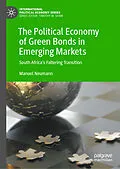"This book is a must read to understand the pitfalls of relying solely on financial innovation to solve the climate crisis." (Matthew Paterson, University of Manchester)
"...an emphatic call for rethinking finance to advance a just energy transition" Mzukisi Qobo, Wits University)
"...required reading for scholars of just transitions in the Global South." (Daniela Gabor, UWE Bristol)
Funding low-carbon transitions to address climate change is one of the major challenges of our time. Green bonds have emerged as a powerful tool to enlist institutional investors' wealth for these transitions. But despite exponential growth in many parts of the world, the green bond market in South Africa has been stalling. This book grapples with this puzzle: It debunks some of the promises underpinning green bond markets globally and traces the manifold practices undergirding its promotion. It then identifies some barriers prohibiting the expansion of green bonds in emerging markets and zooms in on the depoliticizing tendencies a transition premised on financial innovation produces. In the last part, this work discloses the idiosyncratic political economic challenges of a fossil-based economy in transition and shines a light on the competing elements of a 'green' and a 'just' transition. In so doing, this book contributes important new qualitative insights into green bond markets-in-the-making and extends political economic scholarship on finance-led transition endeavors in emerging economies.Autorentext
Manuel Neumann is a Research Fellow at "Glocalpower", a research group anchored in the Department of Political Science at Kassel University, Germany. He successfully defended his PhD at University of Kassel and holds a master's degree in Globalisation and Development from SOAS (University of London). His research features in peer-reviewed journals like the ERSS and Politics & Governance and revolves around the political economy of energy transitions in the global South more generally and green financial tools in particular.
